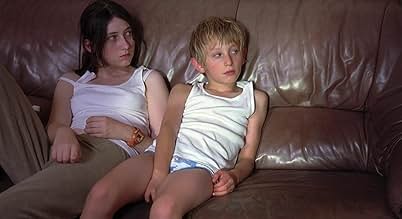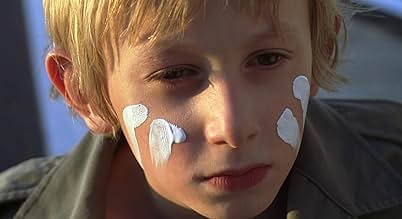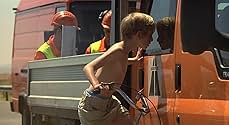CALIFICACIÓN DE IMDb
6.9/10
5.1 k
TU CALIFICACIÓN
La vida de una familia rural aislada se ve alterada cuando finalmente se abre una gran autopista junto a su propiedad, construida 10 años antes pero aparentemente abandonada.La vida de una familia rural aislada se ve alterada cuando finalmente se abre una gran autopista junto a su propiedad, construida 10 años antes pero aparentemente abandonada.La vida de una familia rural aislada se ve alterada cuando finalmente se abre una gran autopista junto a su propiedad, construida 10 años antes pero aparentemente abandonada.
- Dirección
- Guionistas
- Elenco
- Premios
- 10 premios ganados y 5 nominaciones en total
Ivaylo Ivanov
- L'éboueur
- (as Ivailo Ivanov)
Opiniones destacadas
Great insight in EU way of working, the years it takes to built a highway. BUT In the comments i see the movie maker made 1 error: international viewers mostly do not know the way we work in the EU in such cases. If a road, like in this movie, is built, many laws are applicable and even more ways to protest to hold the work up may result in a delay for years. If not all '1000 and one' permits are met, the work has to stop, especially when in the middle of protected nature nearby living area's. The people are no squatters, it is their family home, the children where born there. The parable is great, to be cut off from your existence as you know it, even after years of getting 'warm to the fact this will happen'. This is 1 apart movie, not great, but not small to. Well played, good actors and casting. Different story, deeper meanings in that story. Eight stars ! (I like fast paced movies, ad this is not as fast as the newly built highway which has a big role in it)
Home, the directorial debut from young French-Swiss hopeful Ursula Meier, is a film about communal captivity, the disenfranchisement of an archetypal family unit and, in many ways, it's the 'road movie' of directionless modernity.
This César nominated drama follows a dysfunctional family who live beside an abandoned motorway, somewhere in-between two French cities. Although the house is an uninspired concrete block, their surrounding landscape is rather bucolic in stature, with the kids using the roadway as a garden to sunbathe, take a dip in the blow-up pool, or play street hockey across it's straight, uninspired grey surface. Although we never get the conclusive hows and whys of their unconventional living situation, it's implied that it was a decision of desperation on behalf of the agoraphobic, stay-at-home mother Marthe (the enchanting Isabelle Huppert). When her doting husband Michel (Olivier Gourmet) returns home from work one evening to break the news that the road project is going to reconvene, he is in distress and determined that the family should leave immediately. Marthe is less intimidated, resolute on staying in the unlikely place she has made into an idyllic family home. With cars soon filling the motorway day and night, the risk of pollution causes friction to emanate from within the family, and soon their paradise retreat turns into a tarmacked prison.
Devised by a four piece writing team, including Meier and fellow upcoming European auteur Olivier Lorelle (Days of Glory), it's perhaps no wonder how every character in the family is fleshed out. All play an integral role in the group dynamic, how it will soon be tested and, to an extent, shattered. The suffocating mother Marthe who is afraid she'll lose her family to the outside world, the stoic rock father Michel, the typically angsty eldest daughter, the indifferent and paranoid middle child Marion (Madeleine Budd), and, most sympathetically, the young, curious and adventure seeking son Julien (Kacey Mottet Klein). The cast are all pulling their weight here, particularly Haneke's muse Huppert, in an atypically austere maternal role, matched with Dardenne Brothers' regular Olivier Gourmet as a compassionate father reaching the end of his tether.
As the family's proximate relationship intensifies, the eco-parable is verified, and the drone of cars whizzing past their kitchen window becomes unbearable, Meier resorts to feverish melodrama, with a life-threatening consequence. Cinematographer Agnès Godard manages to make the transition from warm open landscape to claustrophobic crazy pretty aimlessly, but the drastic shift in narrative tone removes any sympathy we once had for the barmy quintet, replacing it with utmost frustration. Why can't they leave? What's so special about the house? Not only implausible, the stir-crazy psychological torment in Home's witching hour ends up compromising what would otherwise be an astoundingly accomplished feature debut.
http://www.366movies.com
This César nominated drama follows a dysfunctional family who live beside an abandoned motorway, somewhere in-between two French cities. Although the house is an uninspired concrete block, their surrounding landscape is rather bucolic in stature, with the kids using the roadway as a garden to sunbathe, take a dip in the blow-up pool, or play street hockey across it's straight, uninspired grey surface. Although we never get the conclusive hows and whys of their unconventional living situation, it's implied that it was a decision of desperation on behalf of the agoraphobic, stay-at-home mother Marthe (the enchanting Isabelle Huppert). When her doting husband Michel (Olivier Gourmet) returns home from work one evening to break the news that the road project is going to reconvene, he is in distress and determined that the family should leave immediately. Marthe is less intimidated, resolute on staying in the unlikely place she has made into an idyllic family home. With cars soon filling the motorway day and night, the risk of pollution causes friction to emanate from within the family, and soon their paradise retreat turns into a tarmacked prison.
Devised by a four piece writing team, including Meier and fellow upcoming European auteur Olivier Lorelle (Days of Glory), it's perhaps no wonder how every character in the family is fleshed out. All play an integral role in the group dynamic, how it will soon be tested and, to an extent, shattered. The suffocating mother Marthe who is afraid she'll lose her family to the outside world, the stoic rock father Michel, the typically angsty eldest daughter, the indifferent and paranoid middle child Marion (Madeleine Budd), and, most sympathetically, the young, curious and adventure seeking son Julien (Kacey Mottet Klein). The cast are all pulling their weight here, particularly Haneke's muse Huppert, in an atypically austere maternal role, matched with Dardenne Brothers' regular Olivier Gourmet as a compassionate father reaching the end of his tether.
As the family's proximate relationship intensifies, the eco-parable is verified, and the drone of cars whizzing past their kitchen window becomes unbearable, Meier resorts to feverish melodrama, with a life-threatening consequence. Cinematographer Agnès Godard manages to make the transition from warm open landscape to claustrophobic crazy pretty aimlessly, but the drastic shift in narrative tone removes any sympathy we once had for the barmy quintet, replacing it with utmost frustration. Why can't they leave? What's so special about the house? Not only implausible, the stir-crazy psychological torment in Home's witching hour ends up compromising what would otherwise be an astoundingly accomplished feature debut.
http://www.366movies.com
Home is a very strange movie. It is a family with two teenage daughters and one young son living in the middle of a huge golden field of grass. A freeway opens right by the house. It gets noisier. The drivers leer. The drivers honk. The noise becomes non-stop. There is a traffic jam and people get out of their cars and stare. The family cannot deal with this and slowly go mad, cementing up the windows. The little boy is the only sane one in the movie. He handles all this as just so much adventure. One daughter is the sort you love to hate, full of herself, selfish, totally absorbed with her appearance, idle, rude. The other is just plain crazy. Mom and Dad are a very loving caring patient couple. It is a movie where the circumstances gradually deteriorate. I think of Roman Polanski's Repulsion for a similar effect. It is like a horror movie -- unpleasantness for the sake of unpleasantness. There are no murders or zombies, just frayed people who cannot cope with the situation. There is quite a bit of nudity, but I just put that down to a difference in the way the French view nudity within the family. It is not sexual. The ending made no sense to me. It just ended things in mid air without any sort of resolution. The whole movie left me queasy, and wondering if perhaps it were some great metaphor than went right over my head.
Kacey Mottet Klein who plays the little boy Julien is an amazing actor. Not once did I notice he was acting. He was completely believable. In one scene he begged his Mom to let him out of being locked in the bathroom. It was heart-melting. I could not stand that frail little character entombed with the rest of that wacko family.
Kacey Mottet Klein who plays the little boy Julien is an amazing actor. Not once did I notice he was acting. He was completely believable. In one scene he begged his Mom to let him out of being locked in the bathroom. It was heart-melting. I could not stand that frail little character entombed with the rest of that wacko family.
The World Health Organisation reckons regular night-time noise of more than 45dB can ruin your health. Here's a film that treats a fact of modern life and turns into a "home under attack" movie. It's coming, and you can't stop it.... It's quite clever to have a home-invasion movie where the alien force is nothing more scary than noise and loss of privacy.
Swiss writer-director Ursula Meier backs this tale of modern times with jazz tracks, classical work, and Nina Simone. The music is a diversion from the relentless pressure building on the family as they face up to life next to a Trans-European highway.
Cinematographer Agnès Godard captures the images brilliantly, from the pose Michel strikes on his car roof with the chest freezer that now has to be delivered across the new road, to the line of holiday traffic stretching into the distance in one long bidirectional jam.
Swiss writer-director Ursula Meier backs this tale of modern times with jazz tracks, classical work, and Nina Simone. The music is a diversion from the relentless pressure building on the family as they face up to life next to a Trans-European highway.
Cinematographer Agnès Godard captures the images brilliantly, from the pose Michel strikes on his car roof with the chest freezer that now has to be delivered across the new road, to the line of holiday traffic stretching into the distance in one long bidirectional jam.
Have you ever found yourself wondering about those people who live right alongside the freeway - the anonymous folk whose lives we peer into briefly as we hurtle our way past their apartments and houses en route to our destinations? Well, the artists who made "Home" certainly have, and the answer they've come up with makes for a fascinating, one-of-a-kind cinematic experience that, even more than most movies, has to be seen to be appreciated.
The family in "Home" leads a relatively carefree and decidedly unconventional lifestyle. Their house stands adjacent to an abandoned freeway, which they use as their own private recreation area. They also view bath time as a communal experience (this being Switzerland and all).
All is going reasonably well (despite some mild familial tension here and there), until one day and without any warning, the roadway is reopened to traffic, shattering the family's once-peaceful existence with the sounds of whooshing cars and honking horns, the penetrating odor of exhaust fumes and fossil fuels, a diminution of privacy (especially during traffic jams), and a nonstop assault on the senses. Even getting to the other side of the road – to school or to work – becomes a daily, death-defying game of chicken with speeding vehicles whose drivers have no intention of slowing down for bothersome and unwelcome pedestrians.
This tremendously odd little film is obviously intended as a parable about the oppressiveness and chaos of modern life as it encroaches ever more forcefully onto the peace and tranquility of a rural existence. The family members become increasingly ill-tempered, paranoid, neurotic, even violent as the outside world inexorably presses its way into their once-placid lives.
But far more than the characters and themes, it is the astonishing mise-en-scene that ultimately works its way into the viewer's psyche and that makes it hard not only to avert one's eyes during the course of the movie but to get back to one's own "reality" once it's over. Director Ursula Meier's work here is reminiscent of Luis Bunuel in one of his less playful moods, as she focuses on a group of everyday people trapped in a surrealistic nightmare from which they are unable to awaken. It is definitely a case in which the scene becomes an integral reflection of the psychological states of the characters.
Isabelle Hupert and Olivier Gourmet play the parents; Madeleine Budd and Kacey Mottet Klein their two children; and Adelaide Leroux, Gourmet's nubile daughter from a previous marriage who spends most of her time sunbathing for the highly appreciative motorists and truckers who keep whizzing on by.
Unique and unforgettable.
The family in "Home" leads a relatively carefree and decidedly unconventional lifestyle. Their house stands adjacent to an abandoned freeway, which they use as their own private recreation area. They also view bath time as a communal experience (this being Switzerland and all).
All is going reasonably well (despite some mild familial tension here and there), until one day and without any warning, the roadway is reopened to traffic, shattering the family's once-peaceful existence with the sounds of whooshing cars and honking horns, the penetrating odor of exhaust fumes and fossil fuels, a diminution of privacy (especially during traffic jams), and a nonstop assault on the senses. Even getting to the other side of the road – to school or to work – becomes a daily, death-defying game of chicken with speeding vehicles whose drivers have no intention of slowing down for bothersome and unwelcome pedestrians.
This tremendously odd little film is obviously intended as a parable about the oppressiveness and chaos of modern life as it encroaches ever more forcefully onto the peace and tranquility of a rural existence. The family members become increasingly ill-tempered, paranoid, neurotic, even violent as the outside world inexorably presses its way into their once-placid lives.
But far more than the characters and themes, it is the astonishing mise-en-scene that ultimately works its way into the viewer's psyche and that makes it hard not only to avert one's eyes during the course of the movie but to get back to one's own "reality" once it's over. Director Ursula Meier's work here is reminiscent of Luis Bunuel in one of his less playful moods, as she focuses on a group of everyday people trapped in a surrealistic nightmare from which they are unable to awaken. It is definitely a case in which the scene becomes an integral reflection of the psychological states of the characters.
Isabelle Hupert and Olivier Gourmet play the parents; Madeleine Budd and Kacey Mottet Klein their two children; and Adelaide Leroux, Gourmet's nubile daughter from a previous marriage who spends most of her time sunbathing for the highly appreciative motorists and truckers who keep whizzing on by.
Unique and unforgettable.
¿Sabías que…?
- TriviaUrsula Meier has been searching for location for nearly one year, even in Canada. Eventually she found a lost part of a highway in Bulgaria. The house in which the movie plays, was built alongside the highway especially for filming. There were up to 300 drivers "playing" the fast moving cars - all were inhabitants of a nearby village. On days without shooting the drivers came visiting the location with their whole families.
- ErroresAn accident halts the traffic on both sides of the highway. Only one side should be affected: the one leading to where the accident took place.
- ConexionesFeatured in Women Make Film: A New Road Movie Through Cinema (2018)
Selecciones populares
Inicia sesión para calificar y agrega a la lista de videos para obtener recomendaciones personalizadas
- How long is Home?Con tecnología de Alexa
Detalles
Taquilla
- Total en EE. UU. y Canadá
- USD 15,925
- Fin de semana de estreno en EE. UU. y Canadá
- USD 1,403
- 6 dic 2009
- Total a nivel mundial
- USD 2,186,716
- Tiempo de ejecución1 hora 38 minutos
- Color
- Mezcla de sonido
- Relación de aspecto
- 1.85 : 1
Contribuir a esta página
Sugiere una edición o agrega el contenido que falta

Principales brechas de datos
By what name was Home (2008) officially released in India in English?
Responda
























